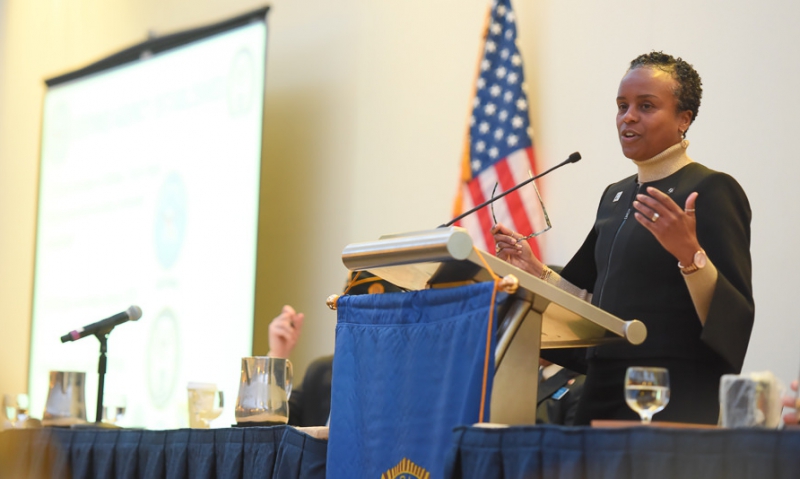
Funding the federal government with a continuing resolution has forced the Defense POW/MIA Accounting Agency to scale back operations.
The failure of Congress to pass a federal budget forced the enactment of a continuing resolution last December to avert a government shutdown. But one ramification of not having a 2017 budget is the negative impact it’s having on the effort to return U.S. servicemembers who are missing in action.
Fern Sumpter Winbush, interim director for Defense POW/MIA Accounting Agency (DPAA), told The American Legion’s National Security Commission that the budget issue was slowing down her agency’s efforts.
“That continuing resolution has significantly impacted our ability to conduct worldwide operations that we had planned for FY 17,” Winbush said Feb. 27 in Washington, D.C., during the Legion’s Washington Conference. “We’ve had to scale back … some of our missions to include Vietnam-related missions.
“What has been very challenging for us is … we also now don’t have the ability to request additional funds like we did last year. In 2016, we were able to garner about an additional $27 million, $21-ish million on top of our allocations.”
The DPAA has been tasked by Congress with identifying 200 servicemembers a year. Winbush said that’s a challenge because many of the remaining cases are some of the most difficult ones. And because some 2017 operations have been scaled back, the agency is performing more disinternments, “Which, of course, many of our family members are concerned about because their loved ones still lie on the battlefield,” Winbush said. “And if we're doing more disinternments, then we’re doing less operations in the field. So I am hopeful that for FY 18 we will be able to ramp up our excavation recovery operations and assess more remains into the lab from the battlefields.”
Winbush said that while there are a total of 83,000 U.S. servicemembers that remain missing, “we assess that only about 26,000-ish of them are actually recoverable. Those are the cases that we will be going after.”
Ann Mills-Griffiths, chairman of the board of the National League of POW/MIA Families, spoke of the closure families cannot gain until their loved one’s remains are returned home. Her brother, Navy Lt. Cmdr. James Mills, was shot down over North Vietnam; his remains have yet to come home, though his plane was located in 2011, changing his status to Presumptive Finding of Death. He now has a gravesite reserved for his remains at Arlington National Cemetery.
“Learning the story … answers a whole lot of questions and brings peace of mind,” Mills-Griffiths said. “When you don’t know what happened and you always have that in the back of your mind … it’s that uncertainty. Ending that uncertainty has always been my goal, but never just about my brother’s case.”
The commission also heard from Brig. Gen. William W. Way, director of Government Relations in the U.S. Army Reserve’s Office of the Chief. Way and his staff spend a lot of time visiting with members of Congress.
“To translate vision, we need financial support,” he said. “Most of America has very little military experience, and that’s not any different in Congress – either for the members of for their staff. It’s up to us to educate. We bring Army leaders to the Hill and Hill leaders to the Army.”
U.S. Air Force Brig. Gen. James Dawkins Jr. – who serves as deputy director for Nuclear, Homeland Defense and Current Operations – said while the U.S. military is paying attention to foreign threats such as Iran, one focus always will remain.
“We cannot forget our No. 1 priority, and that is defending the homeland,” Dawkins said. “That is Job 1 for the joint force. We’re trying to keep things at bay before they come to us.”
Col. Robert Trayers, vice commander of the Air Force Recruiting Service, said Legionnaires play a valuable role in getting young men and women to enlist in the military. He also said recruiters do much more than signing airmen up for basic training. “They’re part of the local communities,” he said. “The first part is to get out and inspire them … wherever they can reach out and talk to the youth of America and let them know of the possibilities that are out there to serve.”
- Security

